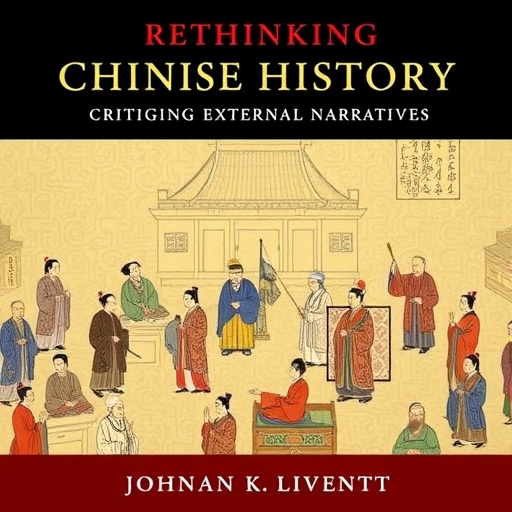In recent years, scholarly discourse concerning the historical evolution of the Chinese nation has taken a transformative turn, reflecting a profound shift in methodological approaches and interpretive paradigms. Wang Y.’s seminal work, “The Historical Perspective of the Chinese Nation: An Analytical Framework Grounded in the Critique of Exogenous Historiographies,” published in the International Journal of Anthropology and Ethnology in 2025, epitomizes this transition by proposing a robust analytical framework. This framework challenges the long-standing dominance of exogenous historiographical narratives and advocates for a more nuanced, indigenous understanding of China’s vast historical tapestry.
The study embarks on a critical examination of prevailing historiographical traditions that have often portrayed Chinese history through external lenses, frequently influenced by colonialist, Eurocentric, or politically motivated biases. Such perspectives tend to marginalize indigenous voices and overlook the intrinsic socio-cultural dynamics that shaped China’s historical trajectory. Wang’s critique underscores the necessity to transcend these reductive paradigms in favor of a historically grounded, context-sensitive approach capable of capturing the complexity of Chinese civilization.
Central to Wang’s analytical framework is the conceptual distinction between exogenous and endogenous historiographies. Exogenous historiographies, often promulgated through foreign scholarship or hegemonic narratives, frame Chinese history within externally imposed categories that impose alien constructs on indigenous experiences. In contrast, endogenous historiographies prioritize internal perspectives, cultural continuity, and localized epistemologies that collectively furnish a more authentic and comprehensive understanding of China’s historical continuum.
The research methodologically integrates interdisciplinary tools, incorporating advances in anthropology, ethnology, and historiography to dissect and reconstruct the Chinese national narrative. By employing a critical lens that interrogates sources, narratives, and historiographical conventions, Wang delineates a path for reclaiming narrative sovereignty. The analytical framework thus functions as both a critique and a constructive roadmap for future historiographical endeavors regarding China.
One pivotal realization emerging from the study is the reciprocal relationship between historiographical methodologies and national identity formation. Histories are not mere chronicles of past events; they actively shape collective memory, cultural self-perception, and political discourses. Consequently, re-evaluating historical narratives through Wang’s framework holds profound implications for China’s contemporary and future socio-political cohesion as well as its positioning on the global stage.
Wang’s critique meticulously deconstructs specific instances where exogenous historiographies have prevailed, highlighting their inadequacies and distortions. For example, the portrayal of China’s dynastic cycles and the “Middle Kingdom” conception is analyzed to reveal how foreign interpretations skew historical understanding, often undermining China’s internal cultural logic and historical agency. This deconstruction provides valuable insights into the epistemic violence historically inflicted through dominant historiographical models.
The framework also places substantial emphasis on the integration of archaeological findings, indigenous oral histories, and vernacular sources, thereby enriching the historiographical corpus with diverse epistemologies. This methodological pluralism enhances the robustness of historical reconstructions and aids in mitigating the limitations posed by traditional textual sources, which themselves are frequently mediated by political and ideological influences.
Furthermore, Wang addresses the challenges of disentangling history from politico-ideological agendas that have at times appropriated Chinese history for nationalist or revisionist purposes. The analytical model seeks to maintain scholarly rigor and objectivity while acknowledging the inherently politicized nature of historical inquiry. This balance is crucial to producing histories that are not only academically credible but also socially responsible.
In the contemporary geopolitical context, where China’s rise has prompted reevaluations of global narratives and power structures, Wang’s framework provides timely intellectual resources. By advocating for an autonomous historiographical approach, the study encourages scholars and policymakers alike to appreciate the heterogeneity and dynamism of Chinese identity beyond monolithic or externally imposed schemas. This paradigm shift can facilitate more equitable intercultural and diplomatic engagements rooted in historical authenticity.
Moreover, the work explores how digital humanities and emerging computational methods can be harnessed to further refine the study of Chinese historiography. Employing data mining, text analysis, and network visualization tools enables researchers to uncover patterns and connections previously obscured, thus complementing traditional scholarly practices. Wang’s analytical framework is adaptable to such technological advancements, signaling its relevance in the evolving landscape of historical research.
The implications of Wang’s findings extend beyond academic discourse into educational curricula and public history projects. Revising textbooks, museum exhibits, and cultural programming to reflect the insights of this framework can democratize historical knowledge and foster critical thinking among broader audiences. This democratization is indispensable for cultivating a historically informed citizenry capable of engaging constructively with China’s past and present.
Critically, the study does not advocate for an uncritical glorification of the Chinese nation but champions a historically responsible and pluralistic approach that recognizes contradictions, contested memories, and diverse experiences within China’s borders. Such nuanced historiography enriches our understanding by embracing ambivalence and complexity rather than seeking reductive coherence.
Wang’s analytical framework also offers comparative potential for other postcolonial or historically marginalized societies confronting similar challenges with exogenous historiographies. The intellectual tools and methodological insights articulated can thus inspire cross-cultural dialogues and collaborative scholarship aimed at decolonizing historical narratives globally.
Finally, the enduring contribution of this work lies in its insistence on epistemic justice in historiography, urging the scholarly community to rectify imbalances that have long silenced or distorted indigenous historical voices. It is an invitation to reconceptualize history not as a fixed repository but as a dynamic, dialogic process reflecting the lived realities of those it describes.
In sum, “The Historical Perspective of the Chinese Nation: An Analytical Framework Grounded in the Critique of Exogenous Historiographies” is a landmark study that reshapes our understanding of historiographical practices related to China. It challenges established orthodoxies, advances methodological innovation, and opens new avenues for scholarship that honor the complexity and richness of Chinese history. As such, it is poised to become a foundational reference for future research in anthropology, ethnology, history, and beyond.
Subject of Research:
Article Title:
Article References:
Wang, Y. The historical perspective of the Chinese Nation: An analytical framework grounded in the critique of exogenous historiographies.
Int. j. anthropol. ethnol. 9, 17 (2025). https://doi.org/10.1186/s41257-025-00140-y
Image Credits: AI Generated
DOI: 16 September 2025
Keywords:




